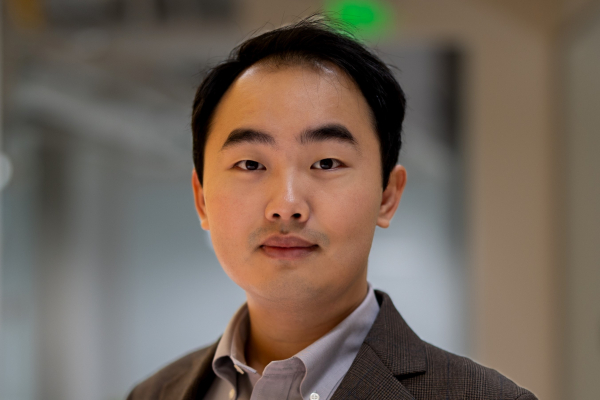
New faculty member Dr. Xin Tang brings expertise in decoding the complexity of cells using AI
This month, the Department of Computer Science (CS) and UBC’s Michael Smith Laboratories (MSL) proudly and jointly welcome Dr. Xin Tang as an assistant professor
Dr. Tang comes to this joint appointment with the MSL and CS after receiving his PhD in Engineering Sciences from Harvard University and the Broad Institute of MIT and Harvard. His work focuses on integrating artificial intelligence (AI) with single-cell biology, to uncover the secrets of individual cells.
Dr. Tang explains the heart of his research, “My work aims to decode the complexity of cells using artificial intelligence. Specifically, I'm developing explainable, biologically informed, and autonomous AI models to predict cellular behaviour at different levels, to advance our understanding of cell biology, brain-computer interfaces, and biomedicine.”
Dr. Xin Tang is one of twelve hires from the most recent Computer Science Department's recruiting season. Read more here
Learning how to “talk to cells”
Dr. Tang describes how AI can potentially allow biologists to better interpret cellular processes. “By building comprehensive computational models of individual cells, we can predict and understand the complex relationships between genes, cellular functions, tissue organization, and disease states. In essence, we're creating a translator for the ‘language’ used by cells. This approach could lead to important advances in various biomedical applications and our fundamental understanding of life processes.”
His previous work has included developing advanced machine learning techniques for single-cell genomics, physiological and spatial analysis, and creating strategies for integrating multiple data modalities. He has co-authored several papers published in prestigious journals such as Cell and Nature.
Improving human health through AI
Dr. Tang believes these models could improve the prediction of individual patient responses to treatments based on their unique cellular profiles. This could lead to more effective, tailored therapeutic strategies and minimize adverse reactions to medications.
This also extends to research on aging, as he says, “Our methods could help identify cellular changes associated with the aging process. This could lead to interventions that promote healthy aging and attack age-related diseases at their cellular roots.”
In the field of brain-computer interfaces, Dr. Tang aims to improve the accuracy and efficiency of neural decoding. “We are developing AI models that can better translate neural activity into meaningful outputs,” Dr. Tang explains. “Our goal is to help people with disabilities control computers or communicate just by thinking, and to make sure this technology keeps working well as their brain changes over time.”
His work is well-aligned with current research programs in single-cell biology at the Michael Smith Laboratories, and the Department of Computer Science’s work with artificial intelligence and computational applications.
“This interdisciplinary environment, which bridges advanced biotechnologies and computational methods, is ideal for my research,” he says. “The potential for cross-pollination of ideas between these two fields is significant, and I'm looking forward to the innovations that may emerge from this unique position. I'm also excited about the opportunity to mentor the next generation of computational biologists in an inclusive and collaborative research environment.”
Dr. Tang’s lab will pursue four main research pillars:
- Develop AI methods that can model cells across time and in different tissue structures, helping us predict how cells behave in healthy and diseased states
- Create interpretable AI models to connect neural activity with behaviours for more effective brain-computer interfaces
- Construct interactive computational models of cells, considered ‘digital twins’, to perform accurate virtual experiments using computers instead of real cells
- Integrate AI models with prior knowledge, to ensure those models make predictions that are interpretable and make sense in their biological contexts
He also expressed how keen he is to engage with the broader Vancouver research community. “The potential for collaboration with nearby hospitals, research institutes, and biotechnology companies opens up new avenues for translating our computational insights into real-world applications, facilitating AI-in-the-loop biomedical research.”
Dr. Tang’s work is not only a great fit for said dual appointment, but it is a great fit for UBC’s investment in artificial intelligence researchers as a whole. In 2021, the UBC Faculty of Science invested $23 million in the form of funding the hiring of 5 new assistant professors via CAIDA’s new research cluster AI Methods for Scientific Impact (AIM-SI). As of this hiring season, AIM-SI has completed its hiring and is preparing to start valuable programming to help bring interdisciplinary researchers together and encourage collaboration.
Collaborative, diverse and innovative
“As an immigrant and one of the new faculty members in my departments, I hope to contribute to the diversity of perspectives at UBC and support international students in their academic pursuits. I believe that diversity in science leads to more innovative and impactful research, and I'm dedicated to promoting an inclusive laboratory culture.”
Outside of the lab, Dr. Tang says he is looking forward to exploring Vancouver’s vibrant culture and enjoying its natural beauty. Please join us in extending a warm welcome to Dr. Xin Tang. We look forward to seeing his interdisciplinary work in action.
More about UBC Computer Science
More about the Michael Smith Laboratories
Learn more about the Tang lab, and how interested researchers can join.